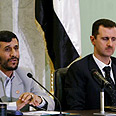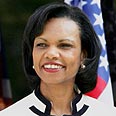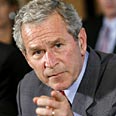


WASHINGTON - The Bush government is trying to stick a wedge between Syria and Iran, using pressure from neighboring Arab countries: Saudi Arabia, Jordan and Egypt, the New York Times reported Sunday.
US President George W. Bush and Secretary of State Condoleezza Rice are expected to meet with Saudi Minister of Foreign Affairs Prince Saud al-Faisal and head of the National Security Council Prince Bandar, in preparation for Rice's trip to Israel. According to the report, Bush will exert pressure on the Saudis to help him in his plan.
The Times report claims that Bush is searching for ways to sabotage the Iran-Syria relationship, but has no intention of appealing to Syria directly. In contrast to the American approach in the past, for example regarding the assassination of former Lebanese Prime Minister Rafik Hariri, this time, US ambassador to Syria Margaret Scobey has not been returned to the United States for consultation.
The Syrian ambassador to the US Imad Mustafa, was recently described as the loneliest ambassador in Washington. In an interview this week, Mustafa admitted that the US government does not approach him at all.
US government sources explained that they are trying a new approach, in which Saudi Arabia and Egypt will try to influence Syria to stop their support of Hizbullah.
To advance this new line of attack, a meeting will be held in the White House with senior Saudi officials, where Bush, Vice-President Dick Cheney, and Rice will be able to examine Saudi willingness to participate in such a matter.
It seems that the leak to the Times is an attempt to sow the seeds for an effective meeting.
"We think that the Syrians will listen to their Arab neighbors much more than they would listen to us," said a government source.
Arab and Muslim pressure on Syria
Bush's objective is to convince Syria to abandon its alliance with Iran and Hizbullah. It is unclear which incentives the US will be willing to extend to Syria in exchange for severing ties with Iran and the terror organization, but Washington sources say that Syria definitely has more to lose than Iran.
Saturday night, in a weekly radio address, Bush blamed Iran and Syria for direct involvement in the conflict between Israel and Hizbullah. Later, the president spoke on the telephone with Turkish Prime Minister Recep Tayyip Erdogan.
The formal purpose of the conversation was to facilitate humanitarian aid to Lebanon and examine potential Turkish involvement in a multinational force in Southern Lebanon. However, given that Turkey has ties to Syria, it is possible that the real reason behind the chat was to promote Bush's plan vis-à-vis Arab and Muslim pressure on Syria.
Diplomats in the know say that Syrian President Bashar Assad has recently started avoiding calls from Arab leaders who wish to express their concerns about Hizbullah actions.
American State Department sources claimed that the US has begun talking to Syria in an attempt to bring the crisis to an end, although Rice has no intention of meeting with Syrian leaders during her upcoming trip to the Middle East.















